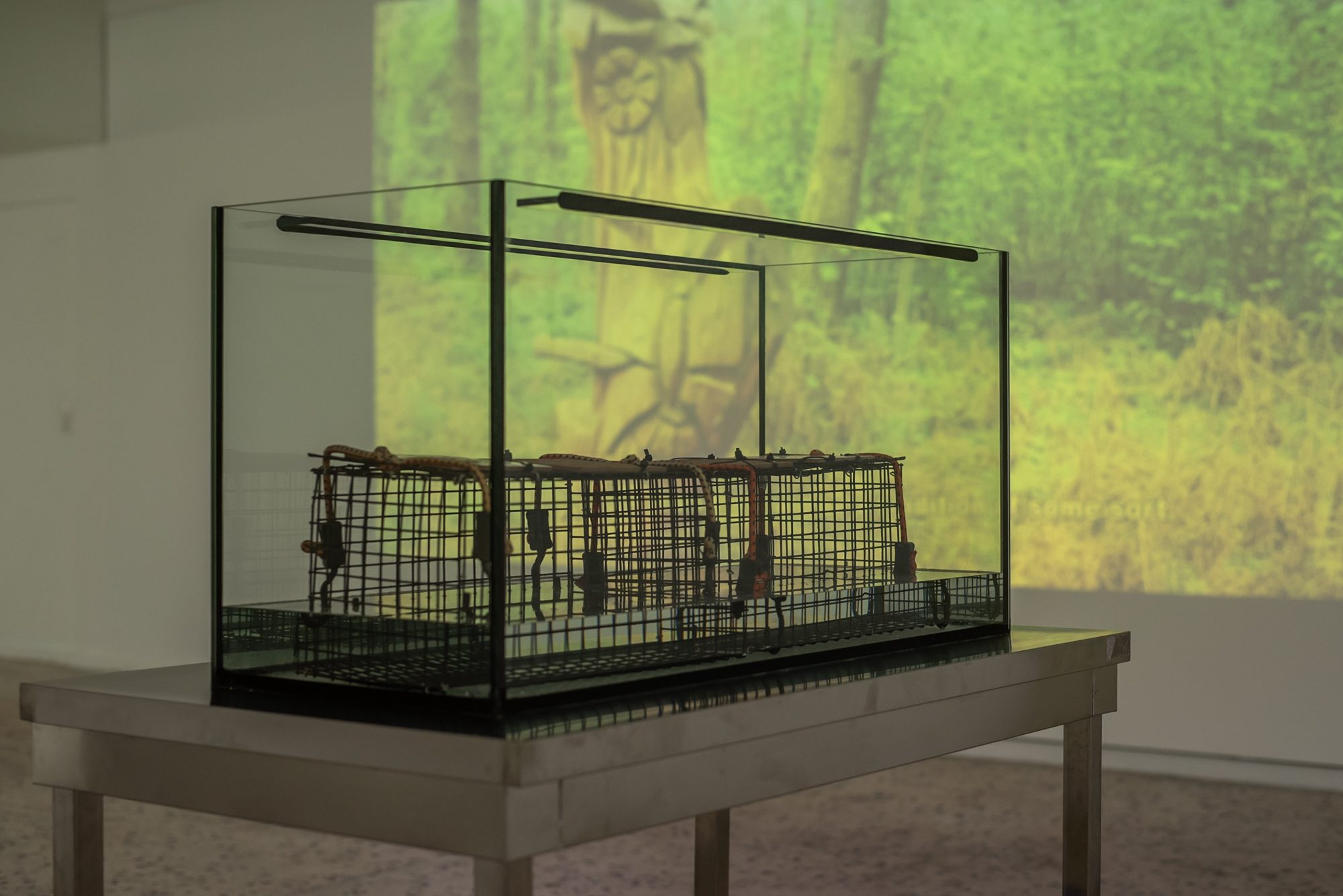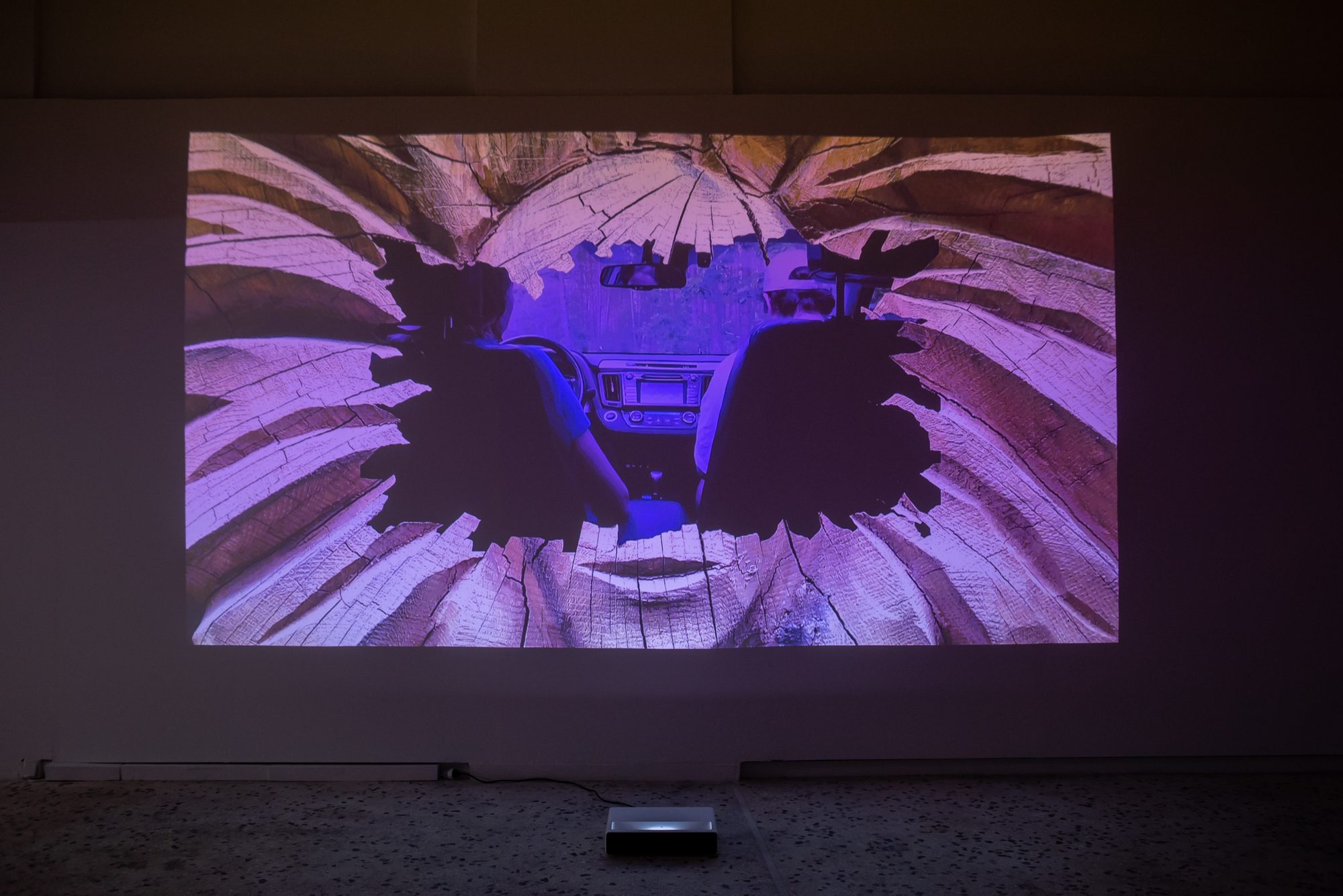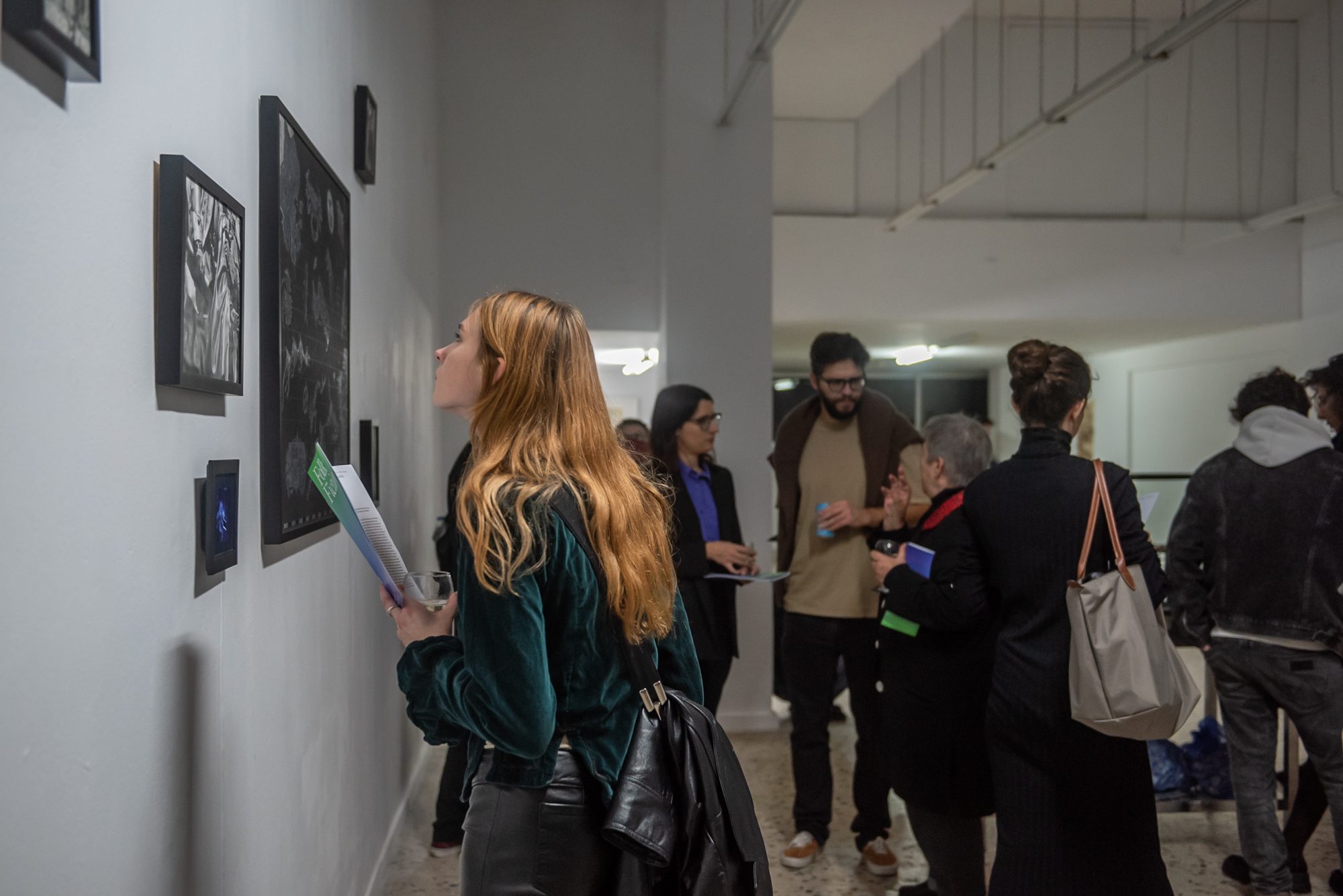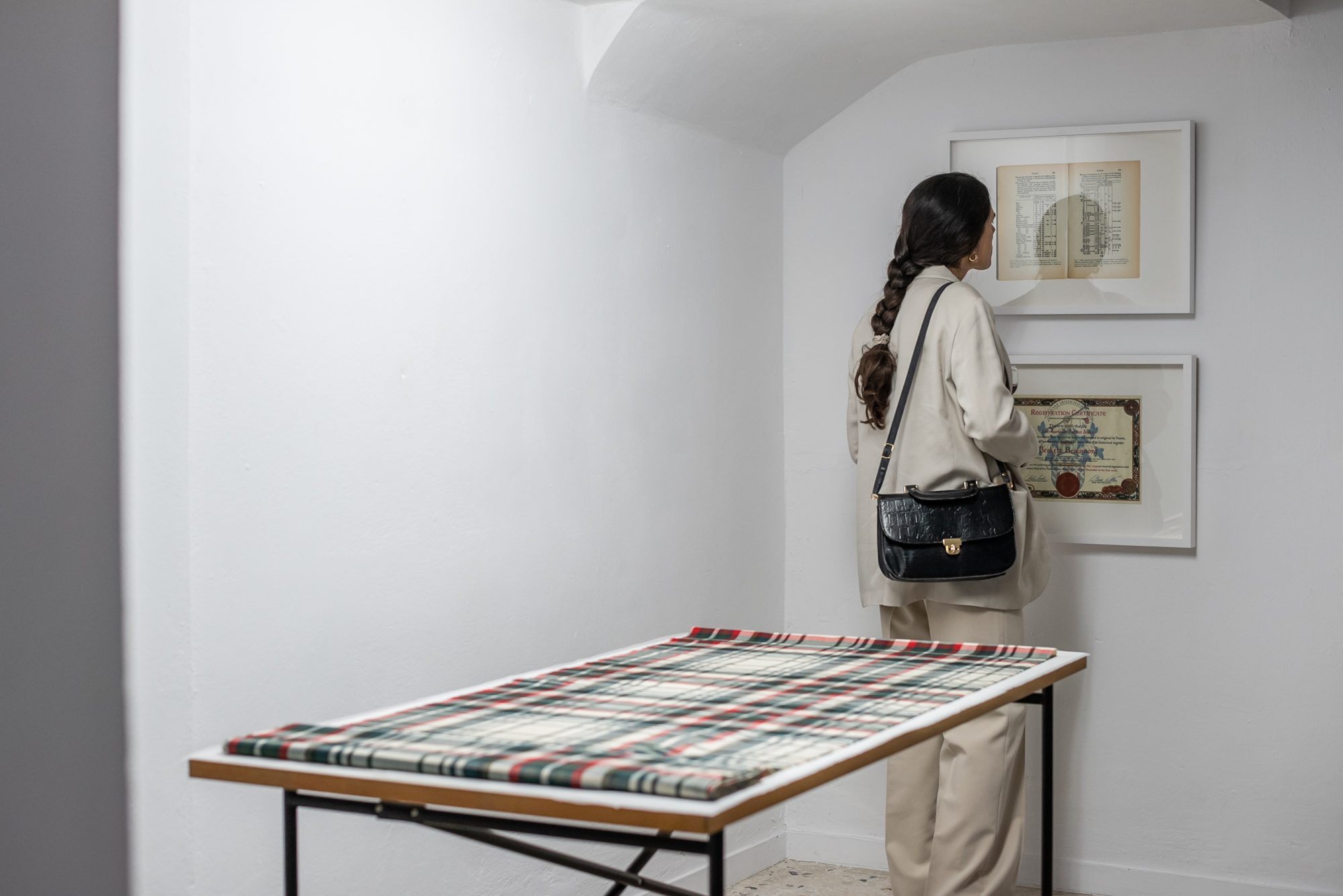Folk Fiction
November 19th – December 22nd, 2022
Opening: Saturday, November 19th at 19:00 pm
At: One Minute Space, Athens
Artists: James Beckett, Jesse Chun, Alexis Fidetzis, Carolina Fusilier and Miko Revereza, Jenny Marketou, Ashkan Sepahvand, Anastasia Sosunova, and Maria Varela
Curated by Ariana Kalliga
Folk Fiction brings together nine artists from different geographies who share a fascination with demarcating and poetically deconstructing fundamental aspects of representation. Pulling away from traditional modes of meaning-making, they look at language as a system of oral resonances and historically imbued forms. By fictionalizing and abstracting, they create new meanings that allow multiple identities to be expressed.
The works on view draw on lores, oral traditions and anecdotal accounts transmitted across times. Considering how these forms of knowledge have been reused and co-opted to build institutional and colonial narratives, the artists explore a double consciousness–simultaneously rediscovering oral traditions and inheritances, and dissembling them in order to examine their implications in the present.
From mythical maps to invented rituals, Folk Fiction looks at the past as imaginatively open-ended. Several of the works on view evoke Saidiya Hartman’s method of “critical fabulation”, which combines fiction and critical historical research to transgress the official accounts of history. Folk Fiction sees how far fabulation can be pushed, and what capability it has for producing multifaceted representations of the past, present and future.
Performance on Opening Night
and speak (why?) with mute ash
The public program of performances and gatherings will start during the opening of the exhibition with “and speak (why?) with mute ash”, a performance by writer and artist Ashkan Sepahvand on Saturday, November 19th at 19:00 pm.
Weekly Exhibition Schedule
Wednesday to Friday: 16:00 – 20:00 PM
Saturday: 12:00 – 16:00 PM
___________________
James Beckett (b. 1977, Harare) is based in New York City, US and Amsterdam, The Netherlands. Beckett’s research-based practice primarily explores overlooked histories. His resulting installations and works for public space deal with the related cultural signs that shape our experience in the modern era. In addition to industry and architecture, his work investigates vocations as diverse as finance, chemistry and dentistry in a neoliberal context. Key in Beckett’s work, is the focus on the physicality of historically-laden objects. Through anecdotal accounts of little-known artists, inventors and workers, he shapes a romantic reading of peripheral historical eves. His approach considers proximity – how close is one able to come to a given subject through tertiary bodies, and what are the implications of their given traces? In the amassing of his own collections, and working with those of museums, Beckett activates objects in order to unpack their abstract and metaphysical potential, often employing the absurd and uncanny to form new perspectives on formative events. James Beckett is in residency at the ISCP, NYC (2021), and has exhibited at the Belgian Pavilion of the Venice Biennale (2015); MAAT, Lisbon (2017); MCAD Manila (2017), The Stedelijk Museum, Amsterdam (2012), amongst others. His work is represented by galleries: T293, Rome; Wilfried Lentz, Rotterdam and Markus Lüttgen, Dusseldorf.
Jesse Chun (b. 1984, South Korea) is an artist living and working in New York. Chun’s work has been exhibited internationally at the Museum of Contemporary Art Toronto, Canada; the Nam June Paik Art Center, South Korea; SculptureCenter, NY; Queens Museum, NY; The Drawing Center, NY; BAM, NY; and the Vera List Center for Art and Politics, NY, among others. Recent awards and fellowships include Art by Translation, Paris (2022); Ballroom Marfa, Texas (2021), and the Joan Mitchell Foundation Painters & Sculptors Grant, US (2020); Smack Mellon, NY (2020); Triple Canopy, NY (2019); and the NEA fellowship at ISCP, NY (2019). Select public collections include the Museum of Modern Art Library, NY; the School of the Art Institute of Chicago; the Smithsonian Institution, DC; Whitney Museum Library, NY; Asia Art Archive in America, NY; and Kadist Art Foundation in France.
Alexis Fidetzis (b. 1987, Athens) uses historical research as a means of artistic creation in an effort to diagnose current social, cultural and political issues. He is interested in the institutional management of collective social trauma alongside the ways in which power structures shape our common past. His work has been awarded by institutions in Greece and abroad, including the Onassis and Niarchos Foundations. In the past couple of years he has presented his work in a solo show at Atopos CVC as well as in the National Museum of Contemporary Art in Athens. Outside of his home country he has participated in group and solo exhibitions in France, Germany, Switzerland and the USA. He studied painting at the Athens School of Fine Arts and the Munich Kunstakademie while he got his MFA at the Pratt Institute as an Onassis scholar in New York City where he focused on research-based artistic practices. He got his second master’s degree on modern Greek history at the School of Philosophy in the University of Athens. He is currently a doctoral candidate at ASFA.
Carolina Fusilier (b. 1985. Buenos Aires, Argentina) lives and works between Mexico and Argentina. Through her work she explores human-landscape relations through intuitive narratives of the future. She has received the Pollock-Krasner Foundation Grant (2019-2020, USA) and her project Kitchen with a view (2019) has been supported by Fundación Jumex (Mexico) and Locust Projects (USA). She has also received The Raul Urtasun-Frances Harley Scholarship (The Banff Center, Canada, 2015). Carolina has a degree in Animated Film (Universidad del Cine, Buenos Aires, Argentina, 2009) and has completed further studies in visual arts and music: Düsseldorf Academy, 2018; Soma Mexico, 2016-2017; Programa de artistas, UTDT, Buenos Aires, 2011. She was also part of Open sessions (The Drawing Center, New York, USA). Recent solo exhibitions include Clepsidra (Daniela Elbahara Gallery, Mexico, 2022) Kitchen with A View, (Locust Projects, USA, 2019), Angel Engines, (Natalia Hug Gallery, Germany, 2018) and Fenómeno (La Fábrica, Buenos Aires, Argentina, 2014). She recently exhibited her work in institutions including the Sculpture Center, New York (2018); The Drawing Center, New York (2019), Centro Cultural Tlatelolco, Mexico (2019), and MAMBA (Museo de Arte Moderno de Buenos Aires, 2022).
Miko Revereza (b. 1988. Manila, Philippines) is a stateless filmmaker raised in California and currently residing between the Philippines and Mexico City. His upbringing as an undocumented immigrant and current exile from the US informs his relationship with moving images. DROGA! (2014), DISINTEGRATION 93-96 (2017), No data plan (2018) and Distancing (2019) have screened at festivals such as Locarno Film Festival, International Film Festival Rotterdam, NYFF Projections, Film Society of Lincoln Center’s Art of the Real and at institutions such as National Gallery of Art in Washington D.C., and Whitechapel Gallery. No Data Plan is recognized with Sheffield Doc Fest Art Award as well as being listed in BFI Sight & Sound Magazine’s 50 Best Films of 2019, Hyperallergic’s Top 12 Documentary and Experimental Films of 2019 and CNN Philippines Best Filipino Films of 2019. Revereza is a 2019 Flaherty Seminar featured filmmaker and MFA graduate at Bard College.
Jenny Marketou (b. 1964, Athens) was born and raised in Athens, Greece and is based in New York. She is an Adjunct Professor at New School for Social Research in NY where she teaches New Media Art and Public Engagement and holds an M.F.A from Pratt Institute of Art. Marketou’s work has been widely exhibited and collected in major museums and cultural institutions, including The School of Water, Biennial de Mediterranean 19, San Marino (2021); Parliament of Bodies, Documenta 14, Athens/Kassel (2017), as well as Manifesta, European Biennial; Biennial of Seville, Spain; Biennial of São Paulo, Brazil; Biennial de Cartagena, Colombia; ZKM Center for Media Arts, Karlsruhe; Museum Tinguely, Basel; Kumu Art Museum, Estonia; The High Line, New York; Museum Reina Sofia, Madrid; Queens Museum, New York, The New Museum, New York, The National Museum of Contemporary Art (EMST), Athens. Her recent multifaceted project titled Serious Games (2021) was presented at Kucuk Hasan Mosque better known as Yiali Tzami commissioned by the Municipal Art Gallery in Chania, Crete. Marketou has received numerous awards, including the CITI Arts Corps Grants, NY (2021) and the Greek Ministry of Culture Awards (2022) for her project Serious Games at Kucuk Hasan Mosque known as Yiali Tzami commissioned in Chania, Crete. Her works have been highlighted in The New York Times and Flash Art, The Art Newspaper, n.paradoxa international feminist art journal, volume #14, among others.
Ashkan Sepahvand (b. 1984, Tehran) is an artist, writer, and translator. He grew up in Tulsa, Oklahoma, and since 2006 lives and works mostly in Berlin, Germany. His practice takes time. His work includes publications, performances, drawings, curated exhibitions, study situations, spread arrangements of images and objects, and regular collaboration with friends. He is primarily interested in translation and its relationship to reading, writing, corporeality, and environment. Recent exhibitions and presentations include: Laqlaq Sessions, Documenta 15 (Kassel), Glitching Code, One Gee in Fog (Geneva), How to Die -Inopiné Book Launch, Tanz im August (Berlin), Feminist Takes: Early Works / Take 4, Kunsthalle Wien (Vienna). He has performed and presented at ICA London, Ashkal Alwan / Homeworks Space, 58th Venice Biennale, Al Mamal Foundation, Klosterruine, Künstlerhof Frohnau, Academy of Fine Arts Munich, University of the Arts Bremen, amongst others. Currently he is pursuing a practice-based PhD in Fine Art at the Ruskin School of Art, University of Oxford, where he is a Clarendon-AHRC Scholar and a Member of St. John’s College.
Anastasia Sosunova (b. 1993, Ignalina) is a visual artist based in Vilnius, whose interdisciplinary practice consists of video, installation, sculpture, graphic art and texts. By employing personal narrative, political myths and explorations of collective agreements, she weaves them into wider stories about communities and identities to come. Sosunova has had a solo and two person shows at SixtyEight Art Institute, Copenhagen (2022); Britta Rettberg, Munich; Screens Series programme in New Museum, New York; Swallow, Vilnius (2021); Kogo, Tartu (2019) and Editorial, Vilnius (2018). She has recently shown her work at the National Gallery of Art, Vilnius (2022) and Kunsthalle Osnabrück (2022), Prospectif Cinéma programme at Centre Pompidou, Paris; FUTURA, Prague, and 14th Baltic Triennial, Vilnius (2021), Riga International Biennial of Contemporary Art 2 (2020), and elsewhere. Sosunova’s published works include “Express Method” (2021) and the digital artist book “Detox Siblings” (2019).
Maria Varela (b.1984, Athens) is an interdisciplinary artist based in Athens who works with creative technologies, data visualization, and weaving through long-term collaborations with women’s communities. She creates digital and physical artifacts, systems, and environments in which the concepts of identity, memory, tradition and folklore are explored. Recently, she was awarded the Selected Art Award by the Taoyuan Museum of Fine Arts in Taiwan (2021) and has presented her work in numerous exhibitions including: Statecraft (2022), EMST, Athens; The event of the thread (2022), MOMus, Thessaloniki, and Sheltered Gardens (2022), PCAI, Athens. She has organized and instructed creative educational programs in Athens in collaboration with the Onassis Cultural Center, Goethe Institut, Michael Cacoyannis Foundation and NEON. She holds an MA in Interactive Media from Goldsmiths College, London.



